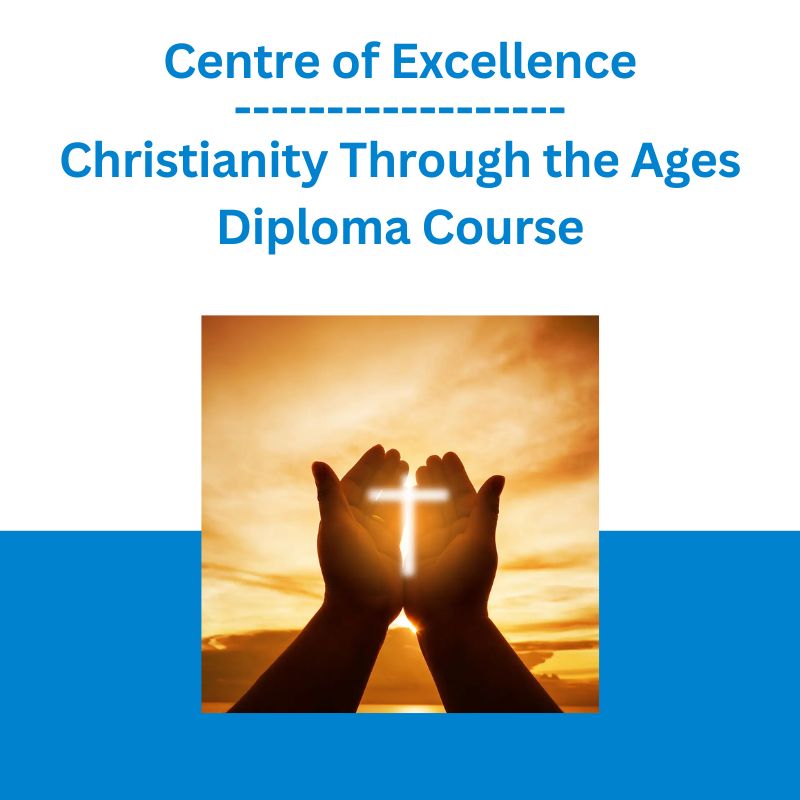*** Proof of Product ***
Exploring the Essential Features of “Centre of Excellence – Christianity Through the Ages Diploma Course”
What Will You Learn?
Christianity is the most-followed religion in the world, but how did it get there? From early Christianity onwards, the Christianity Through the Ages Diploma Course takes you through the history and growth of the Christian faith and its practices.
Beginning with early Christianity, the course covers the Jewish Hellenistic Period, Ministry of Jesus, Apostolic Age and Ante-Nicene Period, before moving onto the early Middle Ages, with the Western Missionary Expansion and Byzantine Iconoclasm, and the high Middle Ages, with the Carolingian Renaissance, Monastic Reform, Investiture Controversy, Medieval Inquisition, conversion of the Scandinavians and the Conversion of the Slavs.
We discuss Eastern Orthodox captivity – delving into the fall of Constantinople, isolation from the West, religious rights under the Ottoman Empire and how the Eastern Church found itself subject to the Turkish system of corruption.
We continue on, to the late Middle Ages and the Early Renaissance, as we dive into the Avignon Papacy (1309-1378), Western Schism (1378-1416), John Wycliff and Jan Hus as well as the Italian Renaissance.
You’ll discover Early Modern Era Christianity with Revivalism, the Great Awakenings and Restorationism, and Late Modern Era Christianity with Modern Eastern Orthodoxy, Modern Trends in Christian Theology, the Second Vatican Council, Ecumenism and the Pentecostal Movement.
We explore the various denominations of Christianity – Catholicism, Protestantism and Eastern Orthodox. We observe Christianity in Britain – looking at Constantine and Augustine, Alfred and the Normans, the Reformation and the English Civil War.
The Christianity Through the Ages Diploma Course concludes with a look at Christian practices, including the Sacraments, Liturgical Calendar, symbols, baptism and prayer.
Course Syllabus
What will I learn on the course?
Module 1: Early Christianity
Introduction
Part 1: Jewish Hellenistic Period
Part 2: Ministry of Jesus
Part 3: The Apostolic Age and Ante-Nicene Period
Test Your Knowledge
Key Learning Points Exercise
Module 1 Assessment
Module 2: Early Middle Ages
Part 1: Western Missionary Expansion
Part 2: Byzantine Iconoclasm
Test Your Knowledge
Key Learning Points Exercise
Module 2 Assessment
Module 3: High Middle Ages
Part 1: Carolingian Renaissance
Part 2: Monastic Reform
Part 3: Investiture Controversy and Medieval Inquisition
Part 4: Conversion of the Scandinavians and the Slavs
Test Your Knowledge
Key Learning Points Exercise
Module 3 Assessment
Module 4: Eastern Orthodox Captivity
Part 1: The Fall of Constantinople
Part 2: Religious Rights under the Ottoman Empire
Test Your Knowledge
Key Learning Points Exercise
Module 4 Assessment
Module 5: Late Middle Ages and the Early Renaissance
Part 1: Avignon Papacy (1309–1376)
Part 2: Western Schism (1378–1416)
Part 3: John Wycliffe and Jan Hus
Part 4: Italian Renaissance (1317–1520)
Test Your Knowledge
Key Learning Points Exercise
Module 5 Assessment
Module 6: Early Modern Era
Part 1: Revivalism
Part 2: The Great Awakening
Part 3: Restorationism
Test Your Knowledge
Key Learning Points Exercise
Module 6 Assessment
Module 7: Late Modern Era
Part 1: Modern Eastern Orthodoxy
Part 2: Modern Trends in Christian Theology
Part 3: Second Vatican Council
Part 4: Ecumenism
Part 5: Pentecostal Movement
Test Your Knowledge
Key Learning Points Exercise
Module 7 Assessment
Module 8: Denominations
Part 1: Catholicism
Part 2: Protestantism
Part 3: Orthodox Christianity
Test Your Knowledge
Key Learning Points Exercise
Module 8 Assessment
Module 9: Christianity in Britain
Part 1: Constantine and Augustine
Part 2: Alfred the Great and the Normans
Part 3: The Reformation
Part 4: English Civil War
Test Your Knowledge
Key Learning Points Exercise
Module 9 Assessment
Module 10: Practices
Part 1: Communal Worship
Part 2: Sacraments
Part 3: The Liturgical Calendar
Part 4: Symbols
Part 5: Baptism
Part 6: Prayer
Test Your Knowledge
Key Learning Points Exercise
Conclusion
Module 10 Assessment
Who Would Benefit from This Course?
Providing an exploration of the global spread of Christianity, this course will be of interest to you if you wish to improve your spiritual life, understand how Christianity affected history and vice versa, or if you have a general interest in the development and uptake of religion.
Please see the full list of alternative group-buy courses available here: https://lunacourse.com/shop/









